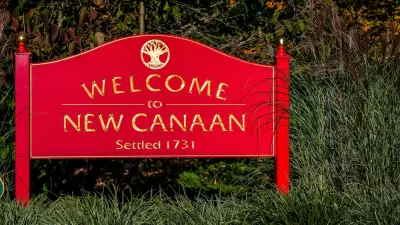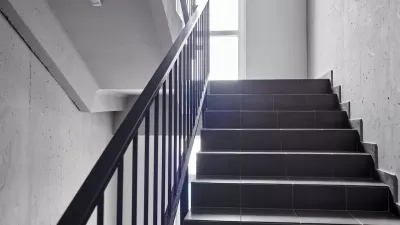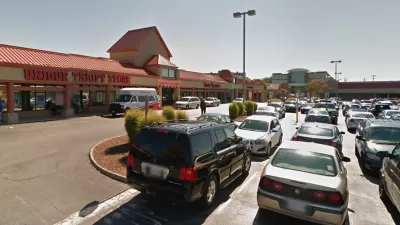The New Canaan Planning Commission rejected a development proposal, including 31 below-market-rate apartments, for lack of a third staircase, among other reasons, at a time when advocates are pushing to relax two-staircase requirements.

One of the emerging causes of the pro-development (YIMBY) movement in the United States is a push to allow single-staircase buildings. The argument: the standard requirement in U.S. building codes for two staircases in every multi-story buildings adds costs and diminishes the designs of new development. The New York Times recently published a long-read on the subject, raising the prominence of the issue of the movement to change staircase requirements as another component of the zoning and development reforms intended to spur new development, such as Missing Middle Housing and parking requirement reform.
Don’t tell any of that to the New Canaan Planning Commission in Connecticut, which recently rejected a proposed affordable housing development for lacking a third staircase, among other issues.
“The Planning and Zoning Commission voted unanimously Tuesday night to deny resubmitted plans for a 102-apartment complex at 751 Weed St. Thirty-one of the dwellings would have been rented out below market rate,” reports Jared Weber for the Stamford Advocate.
“The Weed Street proposal was first rejected in November on the grounds of fire safety, vehicular and pedestrian safety; weaknesses in the storm water management plans; and protection of adjacent and nearby properties,” adds Weber. For this second rejection, the Planning Commission said “the plan’s stormwater management ‘may not adequately capture stormwater’” due to a proposal to expand drainage on a nearby property that the developer doesn’t own. The commission also cited the lack of a sidewalk connected to the property. “The project aimed to rezone the property into a transit-oriented multifamily zone less than a half-mile from the New Canaan train station in the downtown area. But there is currently no sidewalk directly connected to the property, so walkers would have to cross Elm Street at Weed Street, which officials said experiences a ‘large volume of traffic,’” according to the article.
Finally, the commission also rejected the proposal for a lack of a third staircase: “The building’s two stairwells would be located on opposite ends of the building, which would create long travel distances for occupants evacuating and firefighters entering the premises,” reports Weber.
FULL STORY: New Canaan planning commission rejects resubmitted Weed Street proposal, saying it lacks a third stairwell

Maui's Vacation Rental Debate Turns Ugly
Verbal attacks, misinformation campaigns and fistfights plague a high-stakes debate to convert thousands of vacation rentals into long-term housing.

Planetizen Federal Action Tracker
A weekly monitor of how Trump’s orders and actions are impacting planners and planning in America.

San Francisco Suspends Traffic Calming Amidst Record Deaths
Citing “a challenging fiscal landscape,” the city will cease the program on the heels of 42 traffic deaths, including 24 pedestrians.

Defunct Pittsburgh Power Plant to Become Residential Tower
A decommissioned steam heat plant will be redeveloped into almost 100 affordable housing units.

Trump Prompts Restructuring of Transportation Research Board in “Unprecedented Overreach”
The TRB has eliminated more than half of its committees including those focused on climate, equity, and cities.

Amtrak Rolls Out New Orleans to Alabama “Mardi Gras” Train
The new service will operate morning and evening departures between Mobile and New Orleans.
Urban Design for Planners 1: Software Tools
This six-course series explores essential urban design concepts using open source software and equips planners with the tools they need to participate fully in the urban design process.
Planning for Universal Design
Learn the tools for implementing Universal Design in planning regulations.
Heyer Gruel & Associates PA
JM Goldson LLC
Custer County Colorado
City of Camden Redevelopment Agency
City of Astoria
Transportation Research & Education Center (TREC) at Portland State University
Jefferson Parish Government
Camden Redevelopment Agency
City of Claremont





























